10 Best Affiliate Marketing Website Examples to Inspire Your Success

Affiliate marketing websites make money by promoting other people’s products. They don’t sell anything directly. Instead, they send visitors to a company’s site using special links. When someone buys, the website owner gets a commission. Simple.
Some sites focus on product reviews. Others compare different options or offer how-to guides. The best ones don’t just push products. They build trust, answer questions, and help people make smart choices. That’s why they make money.
Studying successful affiliate sites gives you a shortcut. Instead of too much trial and error on what works, you can see it in action. What kind of content do they publish? How do they get traffic? What makes people click their links? Learn from their wins—and their mistakes.
In this list, you’ll find ten best affiliate marketing websites that actually work. I’ll break down their approach, what they do well, and how you can apply it. Whether you’re starting fresh or improving your site, these examples will give you real, usable insights.
What Makes a Great Affiliate Marketing Website?
A good affiliate website doesn’t just throw links on a page and hope for sales. It builds trust, ranks on Google, and keeps visitors coming back. Let’s break down what separates the best from the rest.
1. Pick the Right Niche
Some niches make money. Others make you work twice as hard for pennies. The best ones have demand, low competition, and products people actually buy.
Health, finance, and tech always have buyers. But if you’re passionate about something specific—like hiking gear or minimalist furniture—you can win with smart content and the right audience.
Recommended reading: How to Choose the Best Niche for Your Affiliate Marketing Business
2. SEO: Get Found or Get Forgotten
Google decides whether your site thrives or dies. If you don’t rank, no one finds you.
Good SEO starts with keyword research. You need to know what people search for, then write content that answers their questions better than anyone else. Fast-loading pages, mobile-friendly design, and quality backlinks help too.
3. Content: The Heart of Your Website
Affiliate links don’t make money. Useful content does.
People don’t visit sites to be sold to—they come for answers, recommendations, and reviews they can trust. Great affiliate sites focus on helpful, in-depth content that solves problems. The best ones mix personal experience with data.
A detailed review beats a generic product roundup every time. Real-world use, honest pros and cons, and side-by-side comparisons make a difference.
Recommended reading: Why Valuable Content Wins in Affiliate Marketing (And How to Create It)
4. Monetization: More Than Just Links
Affiliate commissions are great, but smart sites don’t rely on just one income stream.
Many top sites mix Amazon Associates, direct brand partnerships, ad revenue, and digital products (like ebooks or courses). The more streams, the better.
5. User Experience: Make It Easy to Read and Buy
Visitors should find what they need without clicking five times. If your site is slow, ugly, or hard to navigate, they’ll leave.
A clean design, clear headings, and simple call-to-action buttons (like “Check Price” or “See Deals”) make a huge difference. Fast load times and mobile-friendly layouts matter too—most people browse on their phones.
Different Types of Affiliate Websites
Affiliate marketing sites come in all shapes and sizes. Some of the most common:
- Blogs – Personal stories, tutorials, and deep-dive guides.
- Product Review Sites – In-depth reviews, pros/cons, and real-world testing.
- Comparison Sites – Side-by-side breakdowns of similar products.
- Coupon/Deal Sites – Discounts and promo codes to drive affiliate sales.
- Niche Authority Sites – Deep expertise in one area, like photography or fitness.
The best sites mix multiple types. A good blog might have product reviews. A comparison site might throw in a buying guide. It’s all about helping visitors make informed decisions while earning commissions along the way.
10 Best Affiliate Marketing Website Examples
Studying top affiliate sites is about understanding what actually works. These websites aren’t lucky. They’ve nailed their niche, mastered content, and figured out how to turn traffic into profit. Let’s break down what makes them successful and what you can take from them.
1. NerdWallet
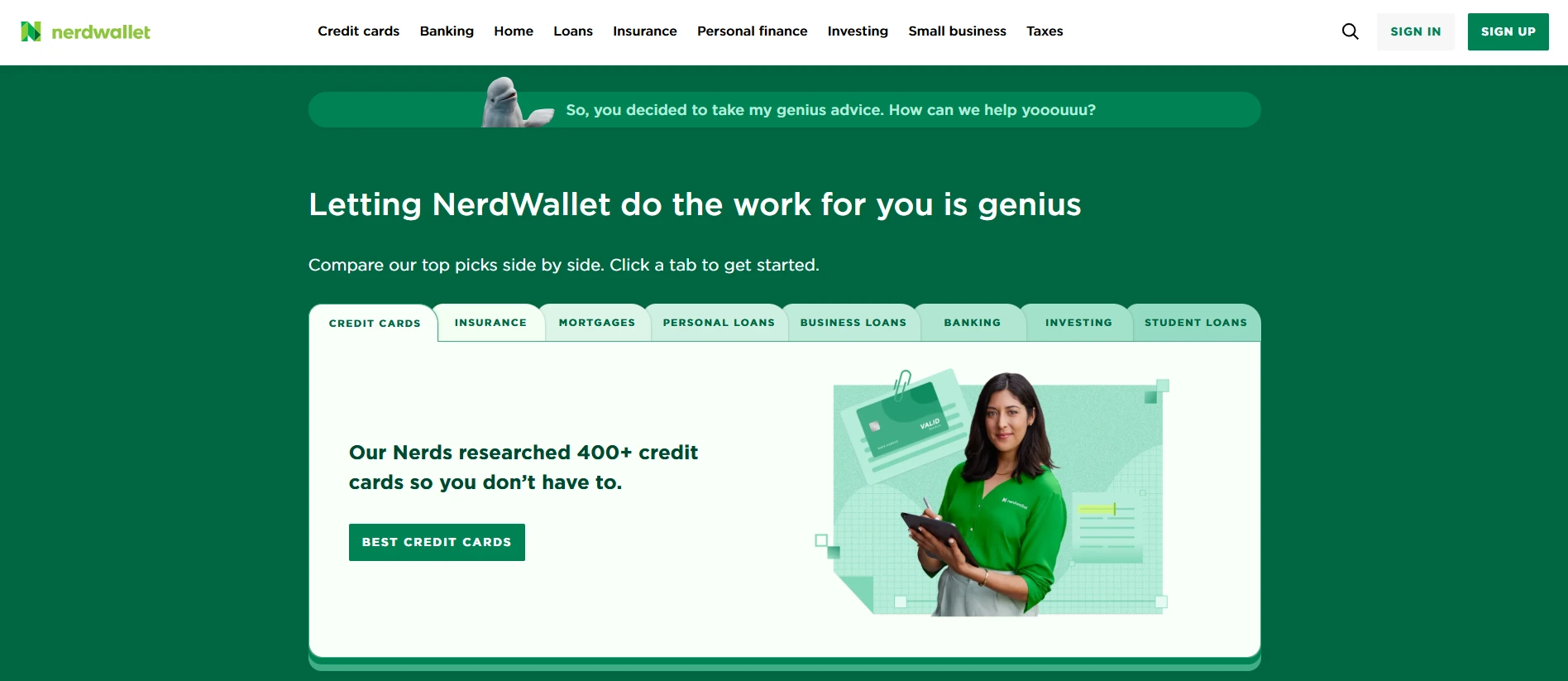
Niche: Personal Finance
Why It’s Successful
NerdWallet dominates personal finance. They review credit cards, loans, and banking options, making complex money decisions easier. They don’t just push affiliate links—they educate. Their content ranks high because it’s well-researched, detailed, and optimized for search engines.
They also build trust. Reviews are unbiased, backed by data, and updated often. People rely on them to make big financial decisions, which means high conversions.
Key Takeaways
- Don’t just sell—help. People trust sites that provide real value.
- SEO matters. Long, well-optimized content wins in competitive niches.
- Authority sells. Strong branding and expert content lead to more conversions.
2. Wirecutter
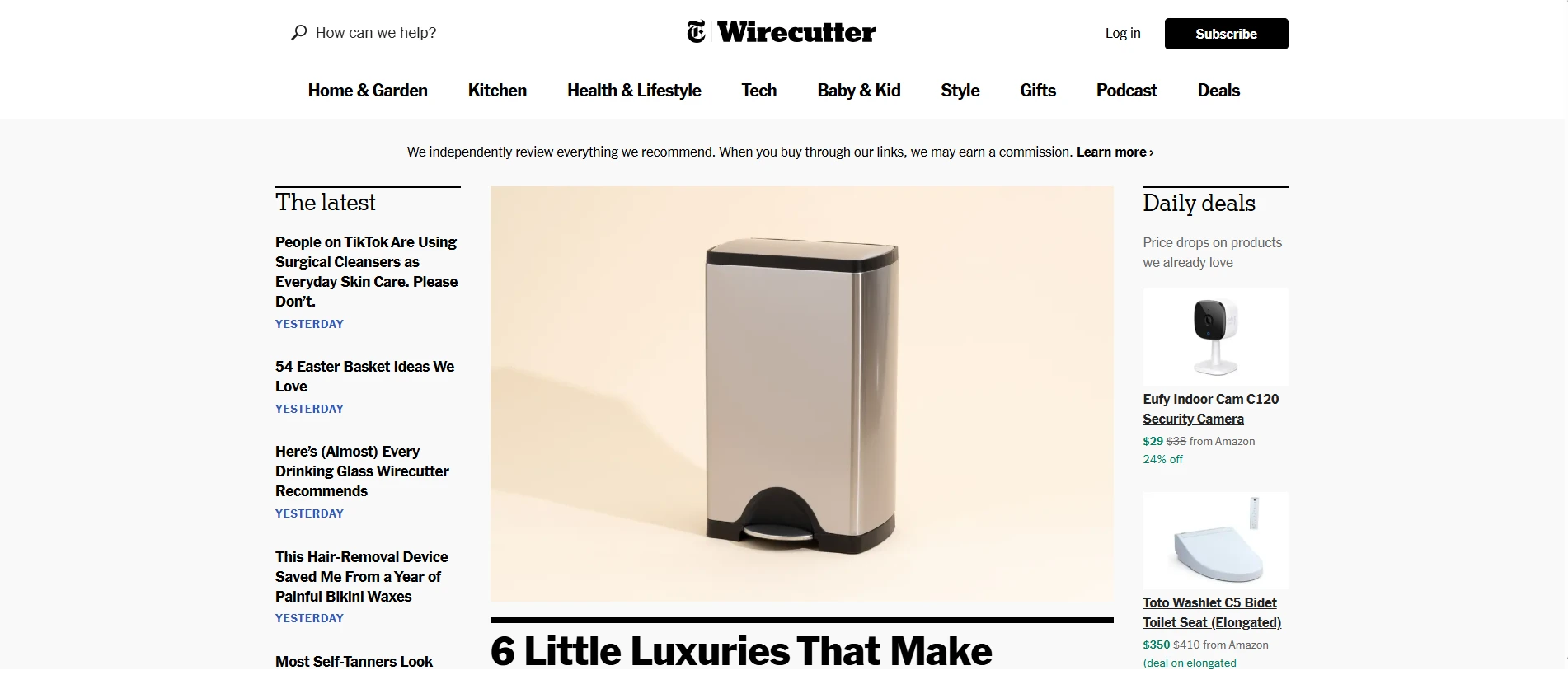
Niche: Tech & Consumer Products
Why It’s Successful
Owned by The New York Times, Wirecutter has insane credibility. They test products thoroughly before recommending them. Their reviews are detailed, honest, and focus on helping users pick the best option, not just clicking a link.
People love in-depth, hands-on reviews. Wirecutter delivers that and more. They also keep their content fresh, updating recommendations as new products hit the market.
Key Takeaways
- Test products if you can. Real experience beats generic reviews.
- Update content often. Fresh reviews rank higher and stay relevant.
- Trust leads to conversions. If people believe you, they’ll buy from you.
3. Healthline

Niche: Health & Wellness
Why It’s Successful
Healthline blends affiliate marketing with expert-backed content. They cover everything from nutrition to fitness gear, but every article is medically reviewed. That credibility keeps readers engaged and drives conversions.
Their SEO strategy is also next-level. They rank for millions of health-related keywords by structuring content well, answering common questions, and citing reliable sources.
Key Takeaways
- Expert validation builds trust. Readers believe content that’s backed by professionals.
- SEO structure matters. Answer questions directly, use headings well, and keep content clear.
- Pick a niche people care about. Health will always be in demand.
4. PCMag
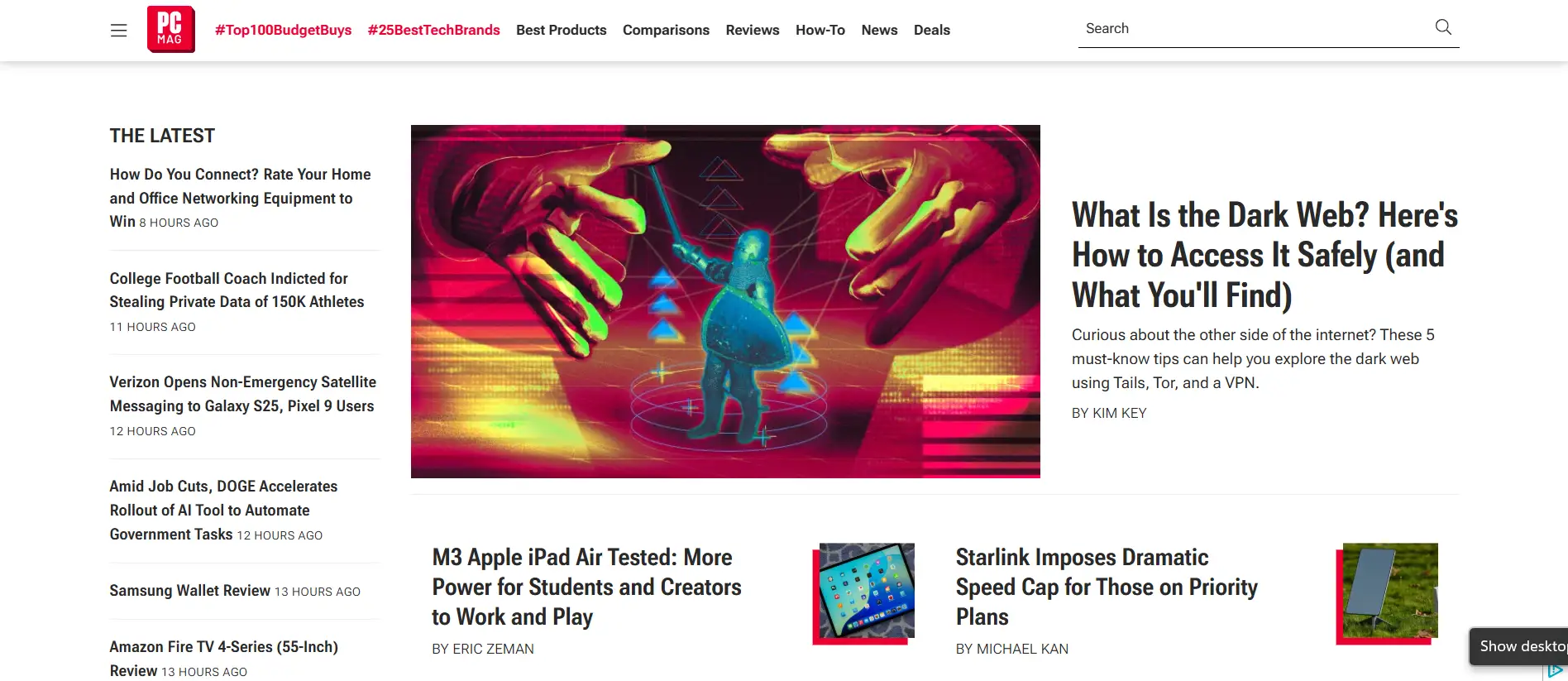
Niche: Tech Reviews
Why It’s Successful
PCMag is one of the oldest names in tech reviews. They cover everything—laptops, software, mobile devices. Their edge? Detailed comparisons and benchmark testing.
They also rank well because of their internal linking. Every review connects to other relevant articles, keeping users on the site longer. More time on-site = higher rankings and more affiliate clicks.
Key Takeaways
- Link smartly. Internal links keep visitors engaged and improve SEO.
- Go deep on comparisons. Users want help choosing the best option.
- Pick a niche with constant updates. Tech is always changing, which means endless content opportunities.
5. PCPartPicker
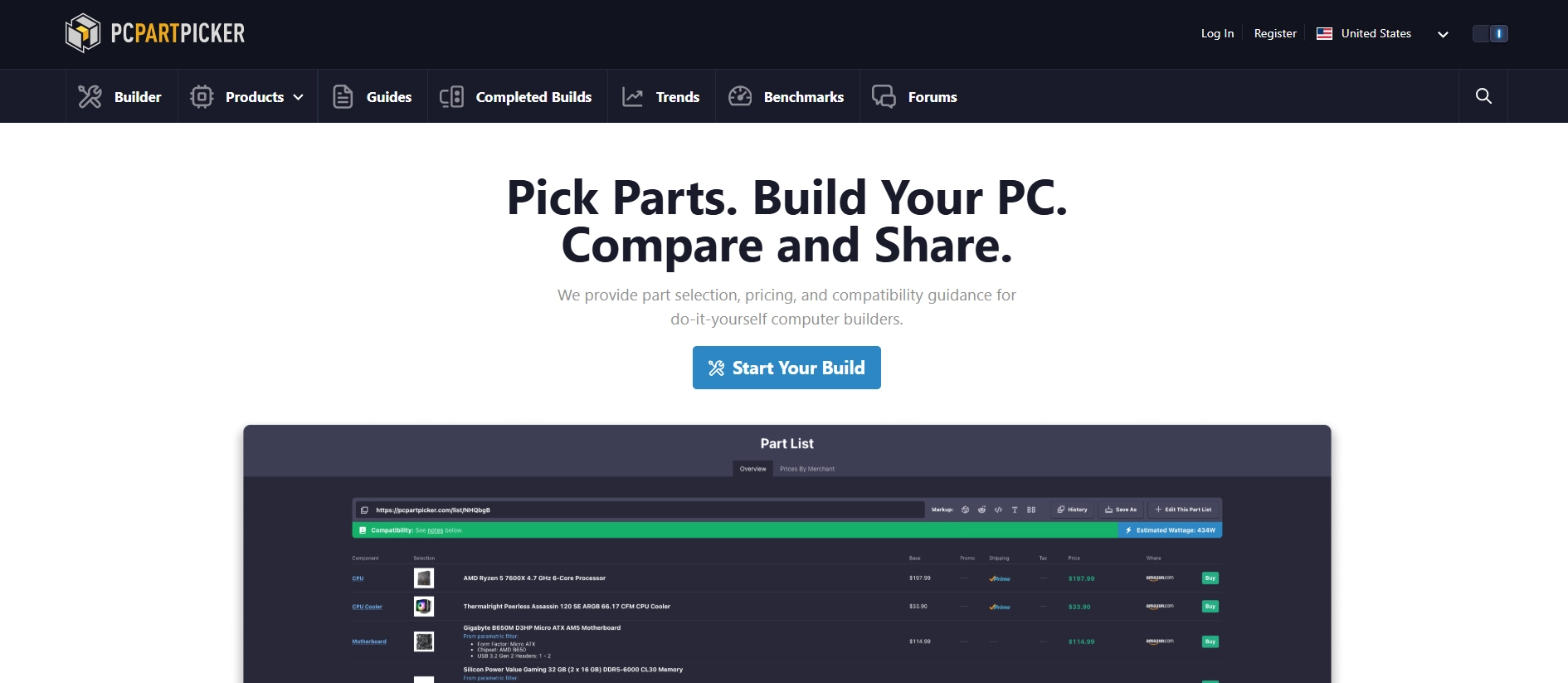
Niche: PC Building & Hardware
Why It’s Successful
PCPartPicker is a dream site for anyone building a computer. It’s not just another review site—it’s a full-blown tool that helps users compare and pick compatible PC parts. That’s its biggest advantage. Instead of just reading about products, users interact with them.
The site automatically checks for compatibility between components, finds the best prices, and even tracks deals. That keeps users coming back. It’s not just about selling—it’s about making PC building easier. And when people trust a tool, they’re more likely to click affiliate links.
PCPartPicker also thrives on community. Users share their builds, ask for advice, and engage with the site beyond just buying parts. That kind of organic interaction builds trust and keeps traffic high.
Key Takeaways
- Give people a reason to stay. A useful tool or interactive feature keeps visitors engaged.
- Solve real problems. Helping users make better decisions leads to more conversions.
- Encourage community. When users contribute, they boost engagement and trust.
PCPartPicker proves that a site doesn’t need just articles—it can win big by offering something unique and useful.
6. This Is Why I’m Broke
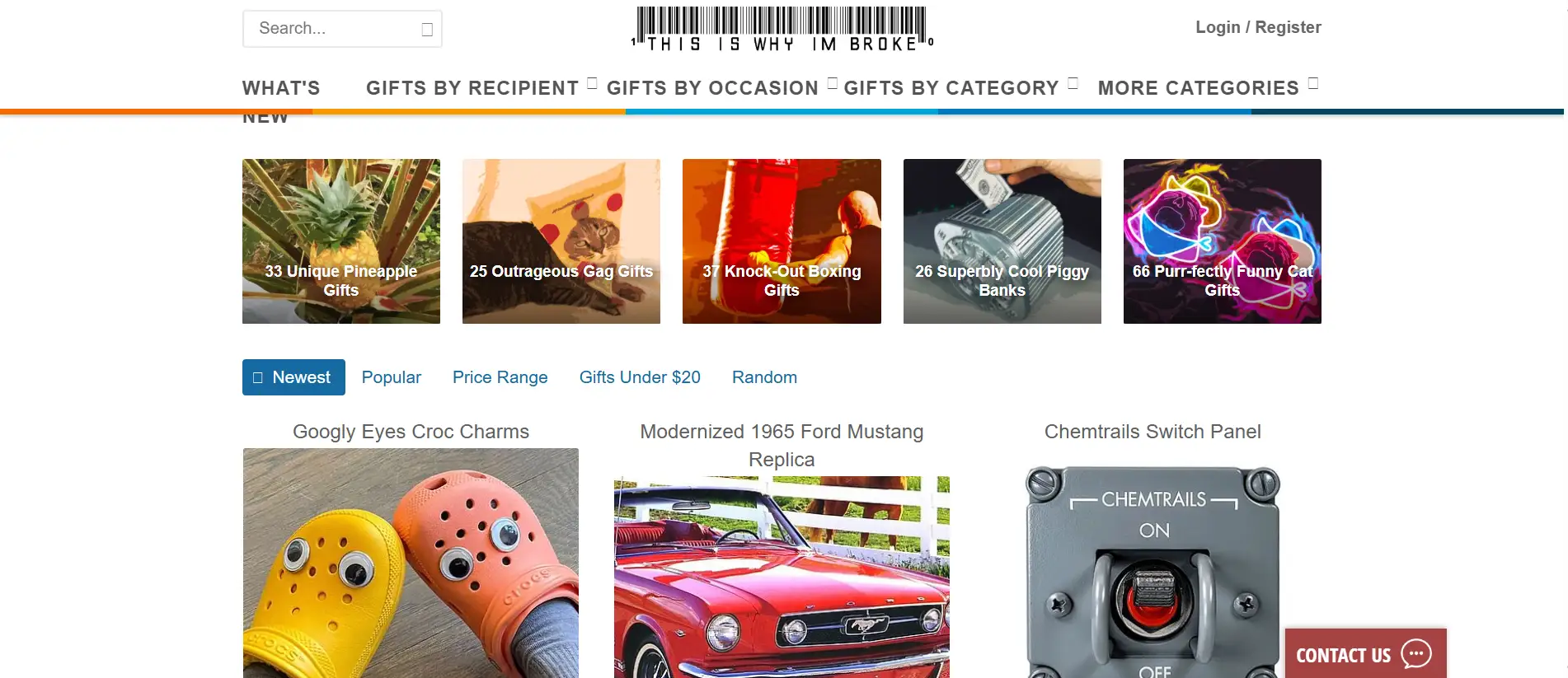
Niche: Unique & Quirky Products
Why It’s Successful
This Is Why I’m Broke doesn’t follow the usual affiliate marketing playbook. It’s not about in-depth reviews or comparisons. Instead, it’s a handpicked collection of weird, fun, and unique products—stuff people didn’t know they wanted until they saw it.
The magic? Pure curiosity. Every visit feels like browsing a gift shop full of crazy finds. Users keep scrolling, clicking, and sharing, which means more traffic and more affiliate sales.
The site also nails simplicity. Each product gets a short, witty description and a direct link to buy. No fluff, no long reads—just straight to the fun stuff.
Key Takeaways
- Make browsing addictive. Unique, unexpected content keeps users engaged.
- Less can be more. Short, punchy descriptions work when the product itself grabs attention.
- Tap into impulse buying. If it’s fun and different, people are more likely to buy on the spot.
This Is Why I’m Broke proves you don’t need a serious niche to win—sometimes, fun and curiosity are enough.
7. HeadphonesAddict
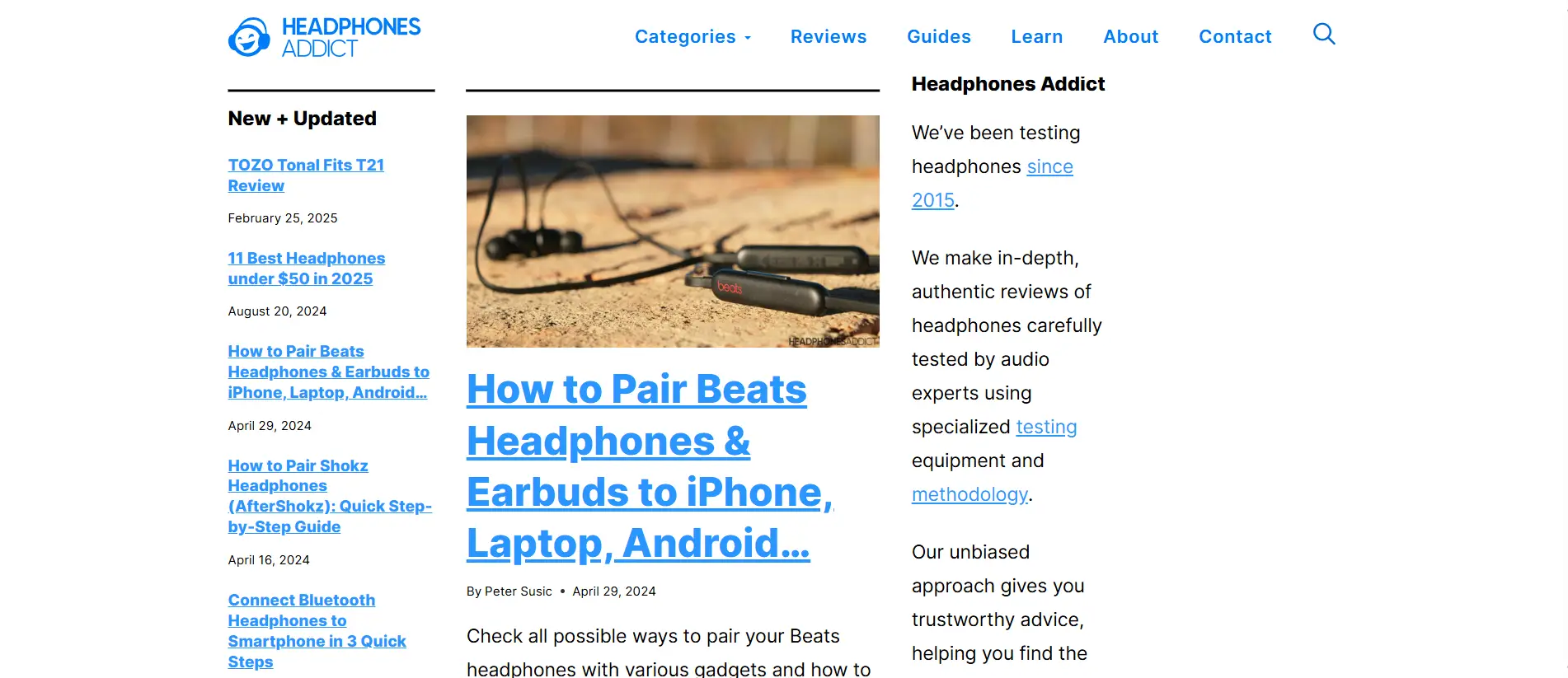
Niche: Audio & Headphone Reviews
Why It’s Successful
HeadphonesAddict focuses on one thing: helping people find the best headphones. They don’t try to cover every tech product—just audio gear. That focus makes them an authority.
Their content is deep but easy to understand. They break down specs without drowning readers in technical jargon. Instead of just listing features, they explain why they matter.
SEO is another strength. They rank well because they target long-tail keywords like “best noise-canceling headphones under $100.” Those searches bring in people who are ready to buy.
Key Takeaways
- Narrow your niche. Specializing in one category makes you more credible.
- Make complex topics simple. Readers want clear, useful advice—not tech speak.
- Go after buyer intent keywords. People searching for specific product comparisons are ready to purchase.
HeadphonesAddict proves that expertise and clear content convert better than generic tech reviews.
8. SafeWise
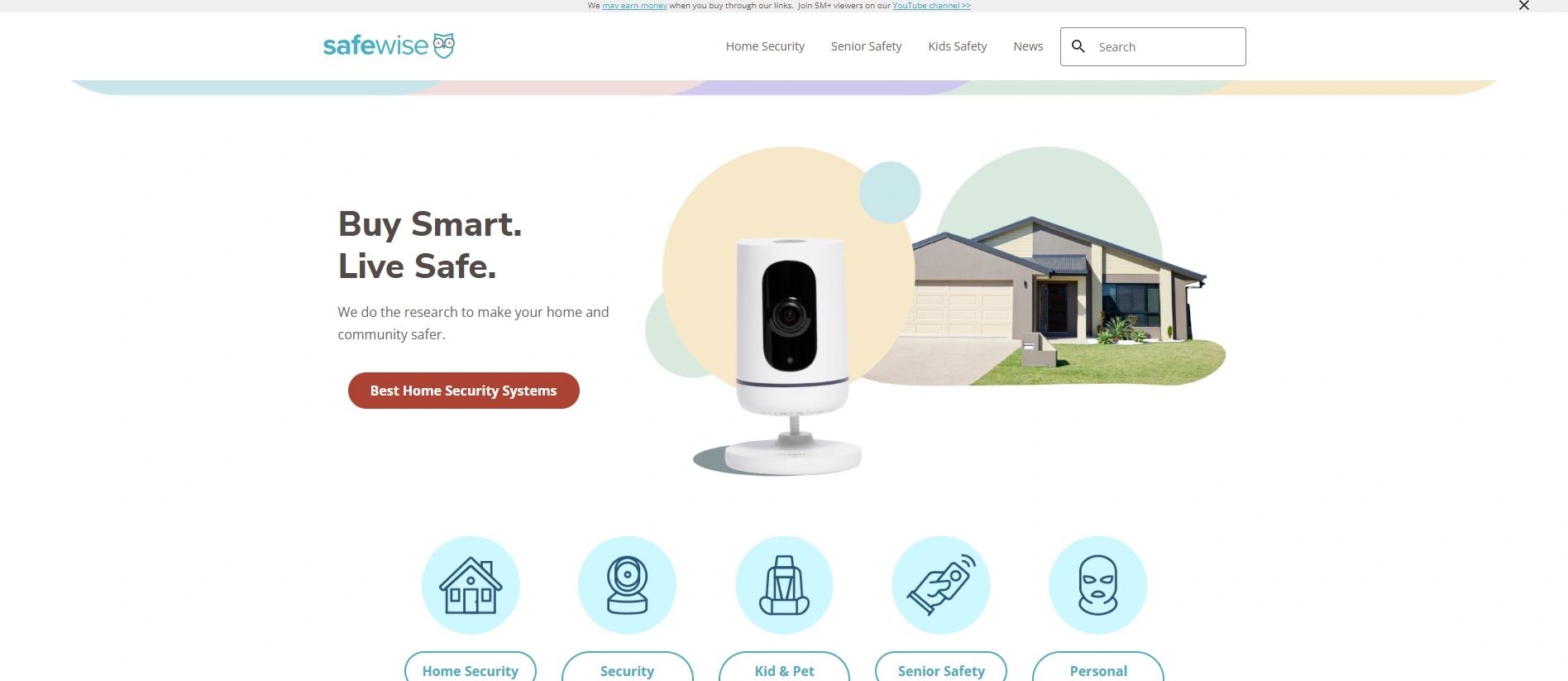
Niche: Home Security & Safety
Why It’s Successful
SafeWise taps into a niche that people take seriously—home security. They review everything from security cameras to alarm systems, making it easy for homeowners to make smart choices.
Trust is their biggest asset. They back up recommendations with in-depth testing, expert opinions, and real customer reviews. People don’t just want a product—they want to feel safe. SafeWise understands that and builds trust through thorough, unbiased content.
Their site is also well-organized. Visitors can compare brands, read buying guides, and even take quizzes to find the best security setup for their needs.
Key Takeaways
- Trust sells. Security is personal, and people buy from sources they believe in.
- Offer more than reviews. Tools like quizzes and comparisons keep users engaged.
- Use expert-backed content. Authority matters in safety-related niches.
SafeWise proves that credibility and user-friendly content are key in high-trust industries.
9. Minimalist Baker
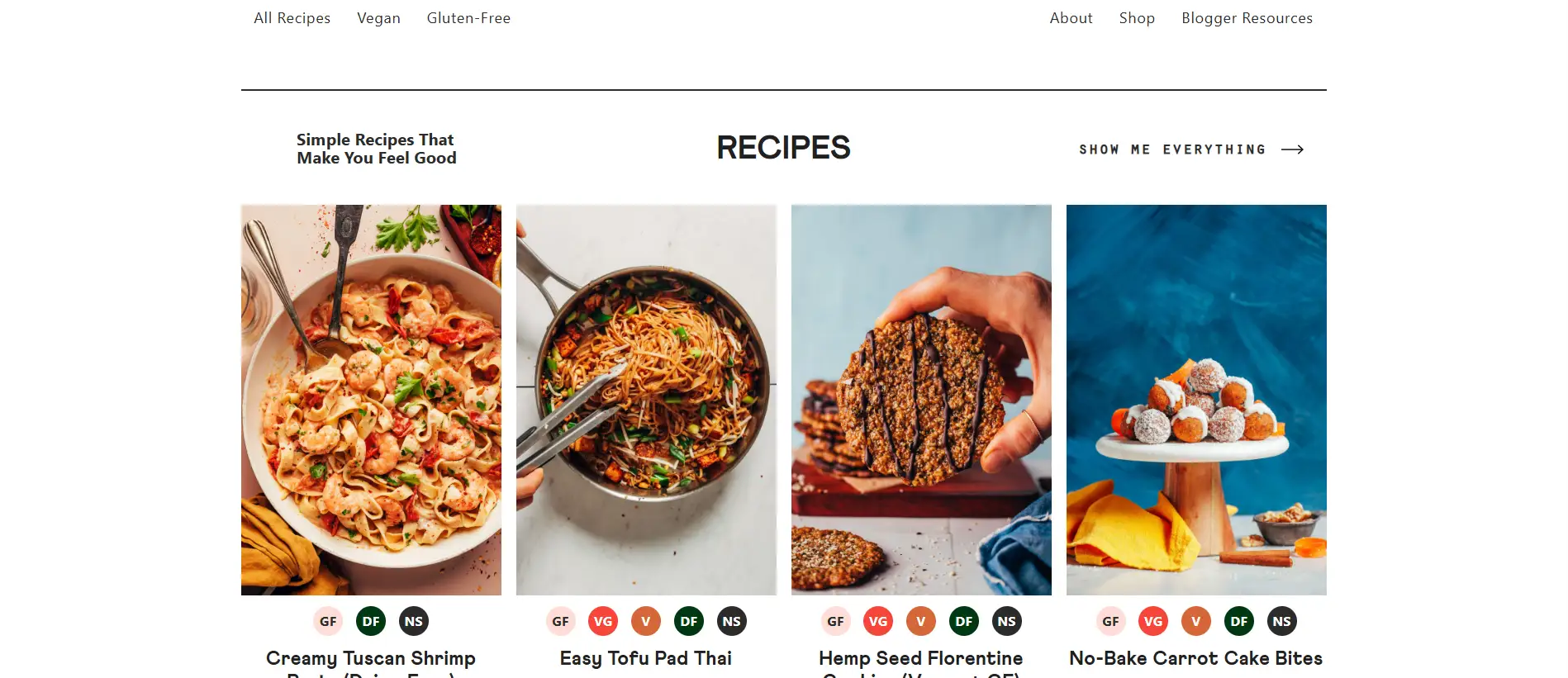
Niche: Simple, Plant-Based Recipes
Why It’s Successful
Minimalist Baker mastered the “less is more” approach. Their recipes use 10 ingredients or less, making cooking easy for beginners and busy people. That simplicity is their brand.
Their content is highly visual. Stunning food photography makes every dish look delicious, and easy-to-follow instructions make cooking feel approachable. The site also integrates affiliate links naturally—readers can buy recommended kitchen tools without feeling sold to.
SEO plays a huge role, too. They rank high for recipe-related searches because their posts are well-structured, mobile-friendly, and filled with useful tips.
Key Takeaways
- Find a unique angle. Simplified recipes set them apart in a crowded niche.
- Use high-quality visuals. Great images make content more engaging and shareable.
- Integrate affiliate links naturally. The best placements feel helpful, not forced.
Minimalist Baker proves that clarity, visuals, and a strong niche focus can turn a blog into a business.
10. Skyscanner
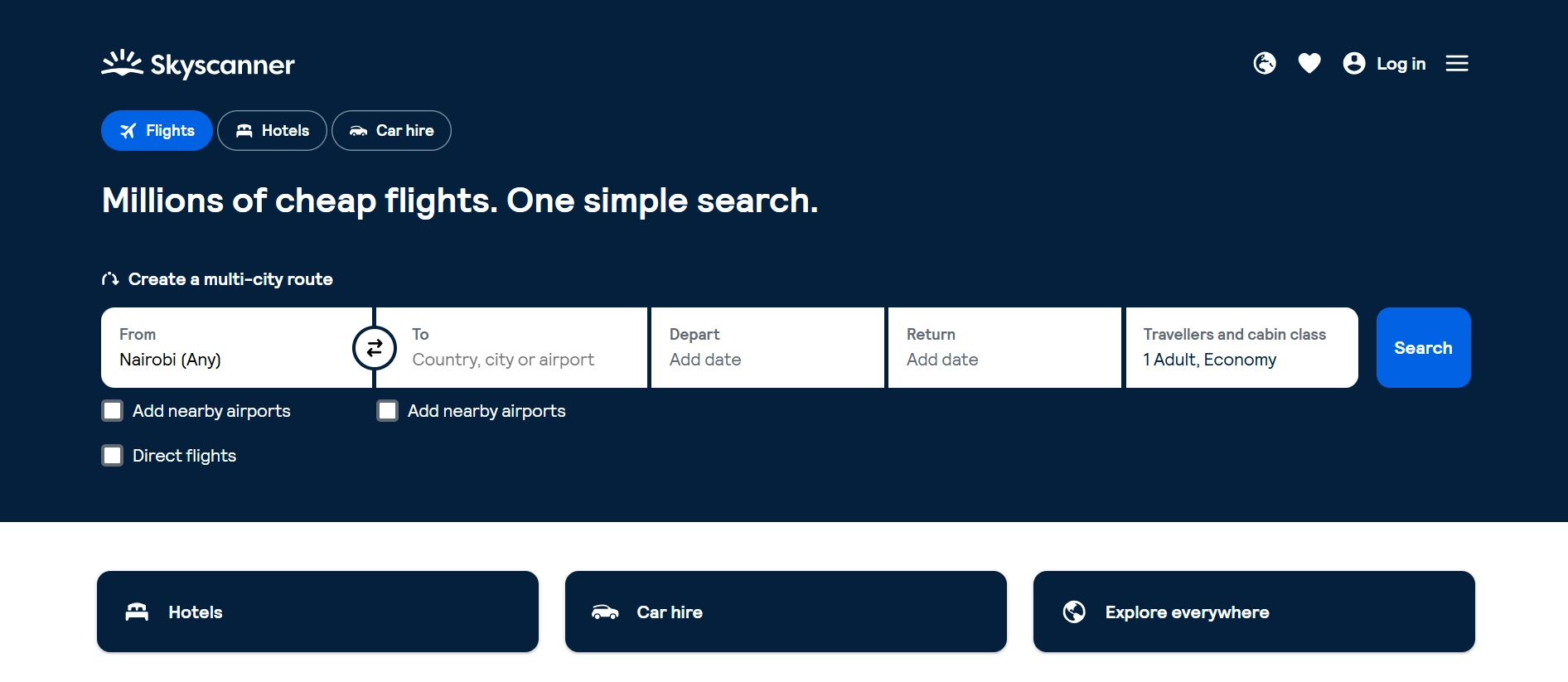
Niche: Travel Deals & Flight Comparisons
Why It’s Successful
Skyscanner isn’t just a travel blog—it’s a powerful search engine for flights, hotels, and car rentals. They make trip planning effortless by comparing prices across different booking platforms.
Their strength is convenience. Instead of visiting multiple travel sites, users get everything in one place. The site also personalizes searches, suggesting the best times to book and sending deal alerts.
SEO and word-of-mouth drive their success. They rank high for travel-related searches and get tons of organic shares because travelers love saving money.
Key Takeaways
- Make things easier for users. A simple, helpful tool keeps visitors coming back.
- Offer personalized recommendations. Showing users the best deals makes them more likely to book.
- Capitalize on shareability. If people love a tool, they’ll spread the word for free.
Skyscanner proves that smart automation and a great user experience can turn a website into a must-use platform.
Conclusion
Successful affiliate websites don’t happen by accident. They all have something that makes them stand out—whether it’s trust, simplicity, expertise, or a unique approach. The best ones don’t just chase clicks. They solve real problems, create useful content, and build loyal audiences.
Look at NerdWallet and SafeWise—they win because people trust them. Wirecutter and PCMag dominate by offering in-depth, hands-on reviews. PCPartPicker and Skyscanner keep users coming back by making buying decisions easier. This Is Why I’m Broke proves that fun and curiosity can drive traffic just as well as traditional SEO.
The key takeaway? There’s no single “right” way to do affiliate marketing—but every great site follows some core principles:
- Pick a niche and own it. Specializing builds authority.
- Give real value. Don’t just push links—help your audience make better choices.
- Make content easy to use. Whether it’s search-friendly articles, tools, or engaging visuals, good user experience matters.
- Build trust. Readers won’t buy from you if they don’t believe you.
If you want to create an affiliate site that actually works, study these examples, learn from them, and find your own angle. The best sites don’t copy—they innovate.
Frequently Asked Questions
What makes an affiliate website successful?
A great affiliate site does more than just list products—it provides real value. Whether through expert reviews, comparison tools, or educational content, the best sites help users make informed decisions. They also focus on trust, SEO, and user experience to keep visitors coming back.
How do affiliate marketing websites make money?
They earn through affiliate commissions. When a visitor clicks a product link and makes a purchase, the site gets a percentage of the sale. Some also use display ads, sponsored content, or premium features for extra revenue.
Do I need a big budget to start an affiliate site?
Not necessarily. Many successful sites started small, with just a niche and quality content. A basic website, good SEO practices, and consistent effort can grow your site over time. However, investing in hosting, tools, and content creation can speed up success.
Can any niche work for an affiliate website?
Almost any niche can work if there’s demand and products to promote. The key is finding a niche where you can add value. Competitive spaces like tech and finance require strong SEO and authority, while unique or underserved niches might offer easier growth opportunities.
How long does it take to see results with an affiliate site?
It depends on your niche, content quality, and SEO efforts. Some sites start earning within months, while others take a year or more to gain traction. Consistency is key—regular updates, strong keyword targeting, and audience engagement will help speed up success.






